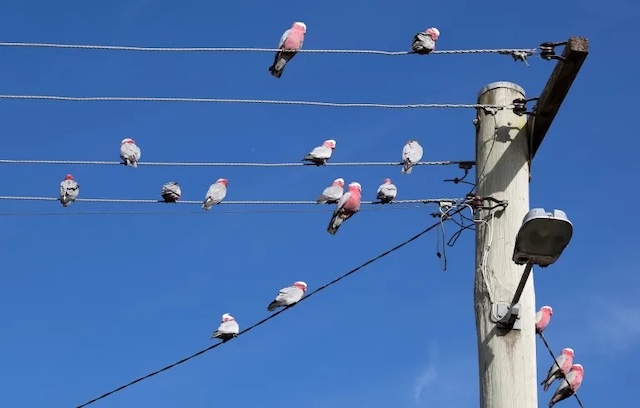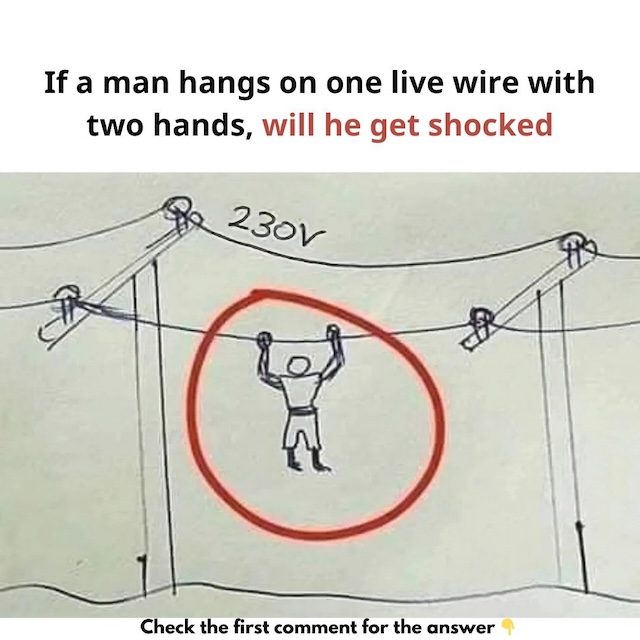Did you know that not every contact with electricity is fatal? The question is: can a man hang on a live wire with both hands and not get shocked? This intriguing scenario has puzzled many, but the answer lies in the science of electrical circuits. In this article, we’ll explore the facts, debunk common myths, and guide you step-by-step to understand why some situations are safer than others. Dive into the full explanation, share your thoughts, and challenge your logic with this electrifying puzzle!
Testing Your Knowledge of Electricity
Have you ever wondered what happens if a person hangs on a live electrical wire? Will they get shocked? This intriguing question combines physics and safety, making it a perfect brain teaser. Before reading further, take a moment to consider: What’s your answer? Comment below to share your thoughts before diving into the explanation!
Video
Escape the hustle and enjoy a moment with these uplifting brain teasers!
Common Misconceptions About Live Wires
When tackling this question, many people jump to conclusions based on their fear of electricity. Here are some common mistakes:
- Assuming any contact with a live wire is fatal: While true in many situations, the context matters. A circuit needs to be completed for electricity to flow through the body.
- Confusing birds with humans: Birds safely perch on live wires, but the reasons aren’t always clear to everyone.
- Ignoring secondary risks: Even if the primary scenario seems safe, real-world factors like wind or accidental contact with another object can dramatically change the outcome.
These misconceptions arise because electricity is both fascinating and intimidating, often leading us to overgeneralize its behavior.

Step-by-Step Explanation of the Scenario
Let’s break this down logically to understand why the man might not get shocked.
Understanding Electrical Circuits
Electricity flows in a circuit, needing a starting point (like a power source) and an ending point (such as the ground or another wire). Without completing the circuit, current cannot flow through a person or object.
The Role of a Single Wire
If a man hangs from a live wire with both hands and does not touch the ground or another wire, there’s no entry and exit point for electricity to pass through his body. He essentially becomes an extension of the wire, remaining at the same potential.
Comparison to Birds
Birds perched on power lines are safe because they touch only one wire, with no pathway for electricity to travel. Similarly, a person hanging on a single wire is at no immediate risk—provided they avoid all other contacts.
What Happens if He Touches Another Wire or the Ground?
If the man accidentally touches another live wire (at a different voltage) or a grounded object, he completes the circuit. The result? A dangerous flow of electricity through his body, causing severe shock or even death.
Real-World Risks
Factors like strong winds, wet conditions, or sudden movements could make the situation hazardous. Even small missteps can turn a theoretically safe scenario into a life-threatening one.
Key Takeaways
- No Shock Without a Circuit: The man won’t get shocked as long as he touches only the live wire and nothing else.
- Unpredictable Variables: External factors make this situation inherently unsafe, even if it seems harmless in theory.
- Electricity Demands Respect: Understanding these principles highlights the importance of caution around electrical systems.

Conclusion: Safety First
So, what’s the final answer? If a man hangs from a single live wire with both hands and avoids any other contact, he likely won’t get shocked. However, this is an incredibly dangerous scenario due to the high risk of accidental contact with another conductive object. Respect the power of electricity, and always prioritize safety over curiosity.
Let us know in the comments if you guessed correctly! And don’t forget to try more puzzles like this to sharpen your logic and understanding.



